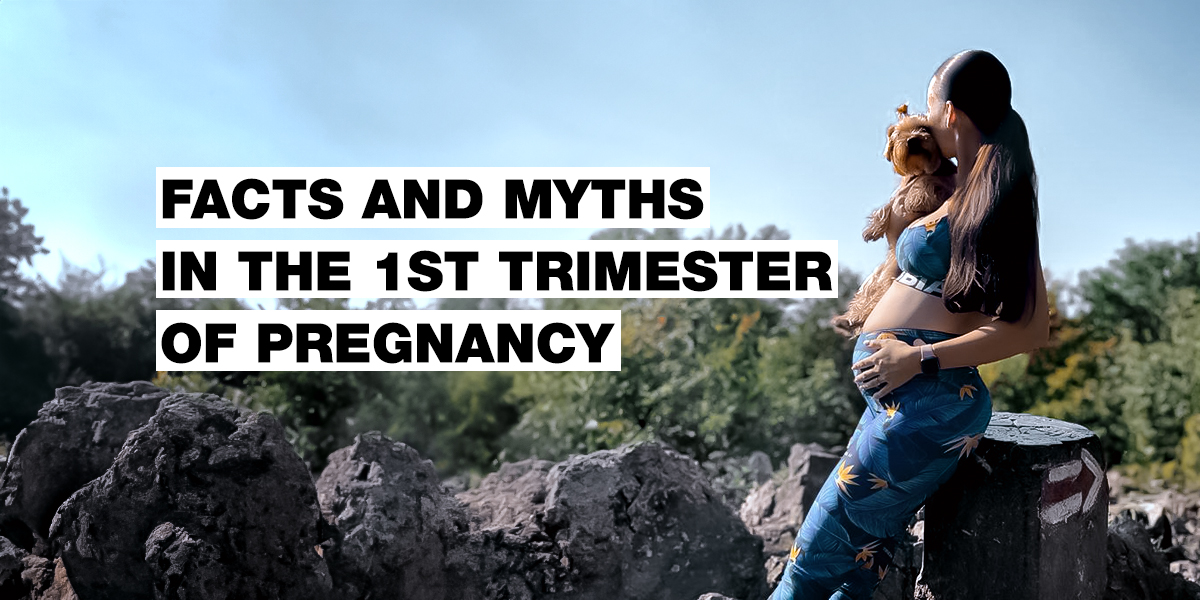Diet in pregnancy is crucial for the healthy development of the baby and the well-being of the mother, especially for active women who want to be in good shape during this joyful period. Our pregnant NEBBIA girl, Nina Velická, has some important tips for you. Follow our trilogy of blog posts Trimester by Trimester to find out what to eat and what to look out for during pregnancy.
Stable calorie intake
In the first trimester, it is important to focus on a balanced diet that supports your health and the healthy development of your baby without having to increase your calorie intake. This period is crucial for fetal development, so choose foods rich in important vitamins and minerals:
Folic acid:
- Folic acid is a very important vitamin that helps prevent neural tube birth defects in early pregnancy. The recommended dose is 400 to 800 micrograms per day. It can be found in leafy greens, asparagus or broccoli. However, it is much better absorbed in synthetic form.
Iron:
- Iron contributes to the production of red blood cells and helps prevent anaemia. Many women need to supplement iron. However, it is much better to get it in a natural way from food, for example by eating red meat, spinach or lentils. However, this is the normal diet of us, gym women.
Calcium:
- Important for building your child’s bones. Sources of calcium include dairy products, broccoli and tofu.
Vitamin D:
- It helps the body absorb calcium and is important for your baby’s bones and teeth.
Nina Velická’s favorite outfit. Dress smart, just like her!
[shop_product ids=”747,745,767″ show_button=0 show_price=1 show_title=1]
Exercising during pregnancy makes you happy
Pregnancy does not prevent you from exercising regularly even during the first trimester. Of course, if you consult your doctor about it. Activities such as brisk walking, swimming or low-intensity training with lighter weights are a great choice. Yoga and Pilates are also suitable for pregnant women as they help maintain flexibility and improve balance and concentration.
However, if you like to do a sport other than those listed above, there is no reason to stop, as long as it does not put you or the child at risk. Especially in the first trimester, the body is visually more or less unchanged and no tummy is still in your way. During the first trimester, Nina hiked, ran and did less strenuous exercises. The first trimester is one of the most critical in terms of fetal development. I kept that in mind during my workouts. I exercised with lower weights than I was used to before pregnancy.
Many people may discourage you from exercising during pregnancy. And you will probably listen to expressions of disapproval throughout the entire period of pregnancy. However, once your body gets used to supplementation, stopping it may be worse than continuing to take it. And if you enjoy exercising and can relax mentally, it’s the best way to keep yourself and your child happy. Because happy mom = happy baby.
Just listen to yourself and your body. It will tell you what it needs.

Facts about pregnancy that you may not know
Pregnant women can’t count how many times they’ve heard: “Now you can eat as much as you want.” But the fact is that healthy pregnant women should not at all how much they want, if they do not want to gain weight significantly. Significant weight gain unnecessarily burdens their body and the baby in it. The choice of nutrient-rich foods is much more important. However, there are important macronutrients of which intake should be increased during pregnancy. It is protein – a nutrient that is essential for healthy fetal development. You can get started with these tips now:
1. Choose whole grain products because they are full of fibre, which can help relieve pregnancy nausea and constipation.
2. Protein snacks such as boiled eggs or yoghurt are a great option during morning fits of nausea and help keep blood sugar levels stable.
3. Do not forget to drink plenty of water to keep your energy up. Water intake helps relieve fatigue and prevent nausea.
4. Omega-3 fatty acids are important for fetal brain development. They can be obtained from fish oil or seeds such as flax and chia.
What to avoid during pregnancy
Choose your food carefully and listen to your body. It often tells you what to avoid. Perhaps like pregnancy nausea. Beware of eating raw and undercooked meat and eggs. Only buy them from known sources to avoid the risk of bacterial infections. They can be a problem even for healthy individuals, not to mention pregnant women. You should pay extra attention to soft cheeses and unpasteurized dairy. They may contain listeria, which is dangerous for pregnant women. Although vitamin A is very important for our eyesight and immune system, high doses can be harmful to fetal development.
A healthy diet and exercise during pregnancy are really important. Rather than eating double portions, focus on a balanced ratio of nutrients, vitamins and minerals. The golden rule of common sense applies even in pregnancy. After all, you will soon become a mom, and moms always know what is best for their baby.





































